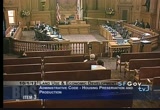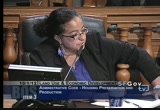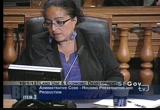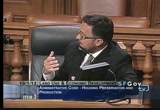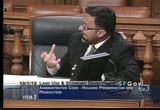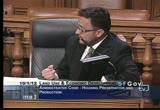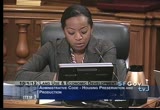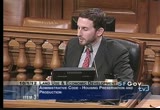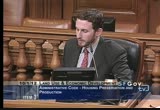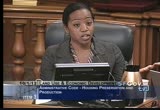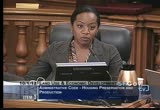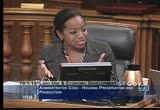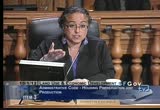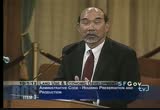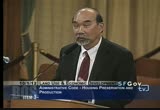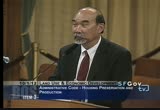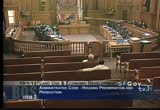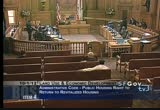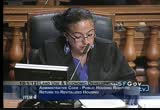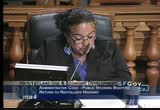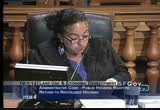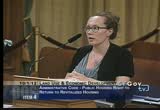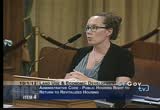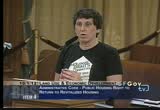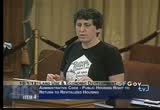tv [untitled] October 13, 2012 12:00pm-12:30pm PDT
12:00 pm
housing at the expense of -- without any consideration given to the whole. so in many ways without more information we're kind of the shot in the dark. i know that because at planning as supervisor campos mentioned it's piecemeal. there is no comprehensive consideration given to things and we go project-by-project. that is what happened in a lot of areas like the mission, where you saw project-by-project, the dismantling of entire communities. and with no consideration ever given to the overall impact that some of these approvals have had. so i know when i was on planning, we approved thousands of units of market -rate housing. i approved and i stand guilty. i'm not saying that i just sat there and just approved housing that was below market rate or anything.
12:01 pm
but i think it would have helped to have had more of a comprehensive view of how our individual elections were impacting the whole. and also the long-term view of housing here in the city. because there was the 10th and market project, i know started out as for-sale units and asked for a conditional use to be considered as rental units. you know, 55 laguna, the project i worked foreperson seven and a halfs and we sat with open houses and debated whether that should be 100% affordable low-income senior housing or not or mixed-use housing? recently those project sponsors came back and wanted to maybe sacrifice some of the middle-income affordable housing for the financing of the senior housing? so that is -- these debates are endless. so i think again it would help
12:02 pm
to have just, you know, more holistic approach to this whole thing. i don't think we have the appropriate analyses sometimes or least i didn't feel that way when we were approving project-by-project things. and i think there is always room to include more information. and so i don't think the conversation ends today. >> thank you, supervisor campos? >> thank you, you know, i have been on this board for four years now. and one of the things that i am very proud of is that when it comes to land use decision-making that we have actually moved into the direction of giving the decision makers more information. i will give you an example. we passed the health care services master plan because we understood that individual decisions were being made by
12:03 pm
the planning commission about projects that had health care implications. and yet there was no consideration for what the health needs of the city were. and so the goal of that legislation was to say before you make land use depictions with health implications you want to know if the individual project advances the health care goals of city? and we approved that, because we believed that the more information that the body, the planning commission has, the wetter the decision. likewise, i'm actually surprised had a we're even debated the use and the help that comes with having more information. i don't see anything wrong with the planning department saying you know what? we have specific objectives that we have to meet with respect to low-income housing, very low net income housing and moderate housing and market
12:04 pm
rate housing and what is wrong with looking at whether or not the approval of that project will thrill move us le actual actually move us closer? i think it would be a disservice phot to the public not to do that. with my were actual le in a way emulating what the private sector was doing because these hospitals had an institutional plan, where they actually had more information that the city had. i would imagine that when a private developer decides whether or not to build a specific project, to market antis to determine the need. so i think in some respects what we're doing is emulating what happens in the free-market.
12:05 pm
the free-market is driven by information. where someone invests their money is has a lot to do with what the need is. and so in temples of wes a city in making an investment in approving or not approving a project, why wouldn't we engage in the same kind of analysis that people in theprive sector engage in all the time? at the end of the day, this dashboard only provides information, but the decision of whether to approve a project or not approve a project rests with the planning commission and if there is an appeal with the board of supervisors. that is in the going to change. there is nothing that takes away that power. so i'm still trying to understand what the problem here is? i would think that the more information that people have the better. >> thank you. supervisor cohen? >> thank you very much, mr. chair.
12:06 pm
listening to supervisor campos's comments it makes me think about our comprehensive approach to cell towers an item we haven't taken up in a while, but i remember thinking that we need a comprehensive strategy to help direct where we can be placing cell towers in strategic locations that won't have avenue adverse impact on the communities, particularly these persons that do not want these cell towers in their neighborhoods. mr. chair, if i may ask supervisor wiener just a couple of questions and just really claire fying questions about the dashboard. i'm curious if you could articulate to me that you said that the dashboard only gives one piece of the puzzle. and i'm wondering if you could give suggestions as to what pieces or what is missing or in what areas that this dashboard in this item that we're discussing is lacking?
12:07 pm
>> sure. as i discussed earlier there were a few areas and just by way of example. it doesn't talk about 120-150%. it doesn't talk about size of units. it doesn't talk about changes to density. it doesn't talk about whether it's in-law units? you know, in terms of how the housing affordability and the crisis that we're facing, it's such a multi-faceted problem. that as i said before, unless we have some huge massive influx of federal dollars so we can just build enormous amounts of below market rate housing, public investment is not going to get us out the hole we're in. it's one piece of the puzzle
12:08 pm
and i will stop using that phrase. [ laughter ] because i have said it too many times already. i'm they are going to start creating a drinking game around it every time i say it. it's not even close to the whole solution and my concern is that this presents a distorted and miss leading picturet planning commission whether project x fits or doesn't fit into where we need to go to resolve our housing crisis. this is not comprehensive and i think we all know how this information presented in this specific way will be used. the information exists. the [phr-rplts/] puts planning department puts out reports and the budget analyst
12:09 pm
puts out reports. this is being presented in a certain way and i believe for a certain goal. and i just don't think it's complete. >> supervisor cohen? >> thank you. so i'm going to pose a question to the project sponsor is. from what i heard it sounds like there is at least room for us to entertain conversations so that we can begin to incorporate some of the concerns that supervisor wein has laid out. one of which i do share, the conversation around 120-150. >> yes, i don't know where we don't add that as an amendment. the size of the unit and
12:10 pm
density like supervisor wiener brought up. those are very interesting and important points that most certainly would, i believe, should be included into the dashboard. so as i'm trying to figure out where i am on this particular issue. on a gut level it seems the dashboard seems to make sense of we use them on our phones and licit rally while we're in our cars. we use the concept of a dashboard and you are right. sometimes the dashboard in the car won't tell you the air tire. yes you do have to go find that information. but if we had the information available, and it's already been published. i would imagine that it would be easy to synthesize and bring together on the dashboard. i really haven't heart enough of a compelling argument from the planning department to speak to me as to why i should not support this dashboard and i welcome planning, if you have any strong feelings, not today,
12:11 pm
not now, but before this item is heard at the full board, we could sit down and have a conversation with you. >> i don't know, supervisor wiener, to say it's not comprehensive, i think i will need a little bit more stronger, more compelling reason to not support this proposal. and i hope that you won't leave the table. i hope you will be able to make it good. because the dashboard, i don't want it to be used to tear down projects. but in a positive sense, i want to use this to begin to create and look at had a we're doing and where we're going. i see it more as a strategic tool. thank you.
12:12 pm
>> supervisor olague. >> i don't see any issue in looking at 150-180. we have already asked for the amendment. i don't know how that works and i'm just a guest and i don't know who approves amendments or what. but we haven't talked about the quarterly report and if people wanted to look at 150-180, i don't have an issue with that really. >> it doesn't sound like that is an amendment on the table right now. >> it's not on the table currently. it just came up today, obviously. >> it sounds like supervisor olague is really open to that. well, mr. chair? >> supervisor cohen. >> excuse me, supervisor chaos. >> go ahead. >> i just wanted to speak to what supervisor olague was saying and maybe if we could hear from planning a little bit more. because i'm perfectly willing to make a motion to make an amendment to include ami up to
12:13 pm
180 ami. so how would this impact the legislation? >> emily rogers from planning department staff. we might -- i see there is another housing expert or two in the audience. director olsen lee from the mayor's office is here, but my understanding is that the rena goals they don't publish goals over 120% of ami. the dashboard is comparing our housing production goals or our housing production compared to the rena goal because they don't publish goals for over 120 ami. >> supervisor campos? >> the thing about tools you can shape them into whatever you need them to obe. i think that having an ongoing discussion about things that can be added to this dashboard, i think is appropriate.
12:14 pm
and it may be, by the way, that as we're going forward with it, that we find there are some things that are not need or snags are some things that are missing that should be added. the main goal is that whatever information the members of this board feel should be included should be included. >> does director lee have anything to add to this? >> we're going to call up olsen lee the director of housing. >> good afternoon, supervisors. olsen lee, director of the mayor's office housing. i was actually here for another item, but i would be happy to jump into this to answer the
12:15 pm
question. as as the issue about the question of 120, and why that is the standard number is not because the other number are not relevant and information is not important about those other number. it's really up to 120 is what our income-restricted units. so the rena estimates are basically up to 120 and these are only income-restricted unit and [pwa-eubs/]ly under basically under the old redevelopment agency, under state health code those units up to 120% of median income. so that whole category of 120-180 was not never codified as units that are restricted under the health and safety
12:16 pm
code. i have been -- 20 years ago, when i was first at the mayor's office, there was income restrictions on older projects up to 150. and there was a whole category of units that were income restricted up to 150. at the time 20 years ago that was over market. clear le the market has changed a little bit at this point and now units are up to 150 are below market. but sort of the fallacy of the rena goal these are units that are restricted and have to come through a public agency to get a restriction on them in some way and undercuts those [ao-eufpt/]s produced by units produced by the market in the 120 and 150 and below that are not restricted by government.
12:17 pm
so one of the dexts in terms of dashboard is how would you identify those restricted from 120 and above? if there is not some sort of obligation nsr or grant and regulatory restriction in and how would the planning department measure that target? would the developer short of self-declare that they are intented to market it the a certain level and the planning department would try to back that into a category for the purposes of the dashboard? so this is a long way of saying that the 120 standard is just based upon sort of the general rena standards people have had sort of positions up-and-down about how accurate the rena
12:18 pm
goals are? and how achievable those goals are? but just to give you some background, that they are related tot fact that that was a standard for determining affordable housing under the state law. >> thank you. supervisor cohen. >> >> the 120 makes sense. >> and how do you estimate 120-150 with different other advice from the mayor's office of housing as well. so if there is no further comment let's call for a recalling on this item. thank you. >> you want a roll call on the amendments? >> first of all can we make the amendments without objection colleagues? >> yes. >> [ gavel ] >> thank you. and now roll call on the item? >> on the motion to send this forward to the board as amended
12:19 pm
supervisor wiener? >> no. >> wiener no supervisor cohen? >> i[stkpwhra*-frplt/] cohen aye. supervisor mar? >> aye. >> mar aye. >> mr. chair we have two ayes and one no. >> thank you. thank you. thank you supervisors olague and campos. miss miller please call the last item on the agenda. >> item no. 4 is ordinance to amend the administrative code for public housing right. >> supervisor olague? >> we're on item no. 4. >> i have another item today that will support low-income tenants in san francisco and promote fair and transparent government. there are a few amendments to the original legislation that i am introducing today. that were working ored on with the housing authority and the mare's office on housing and i
12:20 pm
will invite the representatives up to speak as well to the amendments, although i understand that they are sub [sta-pbts/]ive. so i don't know what that means in terms of process. with the legacy of redevelopment and the more recent predications in the stock of public housing as a result of the federal hope 6 program, my district in particular and other districts have experienced its share of permanent displacement of low-income tenants. this displacement has broken positive community bonds, destroyed tight-knit communitis and contributed to african-american out-migration. with this legislation, no longer will san francisco endorse or fund public housing rebuilds that displace residents outside of their communities or out of san francisco. this is the first step of many that this board of supervisors can take to demonstrate that the city has learned lessons from the ills of redevelopment and has intentionally developed a plan to be more conscious of the families fact impacted by redevelopment type of
12:21 pm
activities. this legislation gives a family that is forced to move a choice in priority to return to the site where their homes once existed. it also begins to rebuild in addition to housing trust between residents and the developer teams charged with redeveloping the site. the high level concept of this legislation do the following: gives households the right to return provided that they have not been evicted. minimizes screening criteria in order to ensure that residents aren't somehow weed out and restricted from the new housing. income eligibility qualifications not be affected theriors city review of any relocation plans and entires [skphrao-eupbs/] with local beliefs. it also required a non-binding recommendation to be issued to the housing authority commission prior to its adoption of the plan. it designated the rent board as the independence third party that will hear any relocation
12:22 pm
claim appeals this. was added in order to maintain an unbiased review of the residents' appeals. i am happy to have worked with the housing rights committee, bay area legal fund, the mays a office of housing, et cetera. i want to thank them for their participation. this legislation is an example of a true public-private and community partnership and i am glad to bring this to the committee today. so i guess i was not aware there was no right to return policy. so that is why we have been working to try to establish something. >> thank you supervisor olague. my understanding is that if mr. givner is determined this is a substantive amendment it has to sit for a week before we take action on item, is that right?
12:23 pm
>> deputy city attorney, yes. >> so supervisor olague, should we open this up for public comment? >> sure. >> thank you. is there anyone from the public that would like to speak on this item? so please come forward, up to three minutes. and a buzzer will go off with 30 seconds to go first speaker. >> good afternoon supervisor, my name is patricia thomas. i have been a receipt here for 15 years, public housing and also i'm board member of pu improvement commission. it's an organization established by residents of pu housing development in san francisco's chinatown. we have 413 households living in the development. and they are mostly low-income, limited.
12:24 pm
english-speaking immigrant families and seniors. for many of us it's been a long time. it took us a long-time to get to public housing. once we were there, we put down roots. this becomes our home, not just a unit in a building. and the people around us become our family. to be displaced for a revitalization project means leaving our home and family. this is very frightening, especially when there is no ordinance to protect our right of return, once the development work is completed. to further protect us, we should not have to go through additional screening in order to return. the housing authority has already checked and approved our eligibility. it is also not cost efficient to rescreen. not to mention the extra burden it puts on us. this is why myself and i'm sure
12:25 pm
many others are in support of the right of return proposed ordinance. we need to know that after being displaced by public housing revitalization projects we have the right to return to enadjacent newly envated facilities ops the work is completed. we truly hope that you agree. thank you. >> thank you.
12:26 pm
>> public housing often fosters the development of [kph-ufpbt/] community bonds and when people are forced to leave the community, the bonds are broken and it's tremendously destructive to the community. supervisor olague has already told us previously there was no right to return and i wanted to point out what is now required is that when a public housing development is destroyed and is going to rebuild, what happens is that familis are given vouchers or money in order to relocate. and because of the very high rents in san francisco, what often happens is that the families don't actually have enough money with the voucher or that relocation fund to stay in san francisco. so they are forced to go out of the city completely and then during the time that the building is being rebuilt, they build up a whole new life and their children go to new school and they are never able to go back. so it's
12:27 pm
trespassly important to many san francisco residents, particularly the african-american community. and this has already been brought up, but 35% of people in san francisco who live in subsidized housing are african-american. and 20% of african-americans in the city of san francisco reside in public or subsidized housing. so we're talking about a big portion of this community and we're aware we're suffering a real loss in that area and we're losing our african-american population. so the right to return would go a long way towards preventing further loss. >> can i just ask you to repeat the statistics, you said that% of the african-american lives in public housing? >> 20% -- there are -- two numbers, 35% of substance duesed and public housing is african-american and separately, if you look at entire population of san francisco, 20% of the african-americans are in public
12:28 pm
or subsidized housing. sorry to confuse you. thank you very much. >> thank you. next speaker. - >> hello again. i'm sarah shourd with housing rights committee. we serve residents of public housing and so we have heard many, many of the stories of the fallout from hope of, which was the hope sf predecessor federal program to revitalization public house. so we're acutely aware of the problems caused by that, where tenants were simply displaced and fell through the cracks due to lack of monitoring. they were given vouchers and therefore, moved to other cities. there simply weren't enough units, so people couldn't come back and due to screening and eligibility requirements, people were left out of the new
12:29 pm
developed units. and so in light of those stories that we had heard from our clients, we have actually worked with supervisor olague's office to craft this legislation, because we saw the writing on the wall. with hope sf happening, a program that we do support, because our public housing stock is so severely distressed that we do need to rebuild it and we have no federal funds to continue operating it as it is. and so we wanted to make sure we could have the best of both worlds, which is to have newly developed housing that is habitable for its residents. and also have the residents who currently live there be the beneficiaries essentially of these new, shiny units. and therefore, we thought this was the best possible way to ensure that if people are in good standing, they get back to
60 Views
IN COLLECTIONS
SFGTV: San Francisco Government Television Television Archive
Television Archive  Television Archive News Search Service
Television Archive News Search Service 
Uploaded by TV Archive on

 Live Music Archive
Live Music Archive Librivox Free Audio
Librivox Free Audio Metropolitan Museum
Metropolitan Museum Cleveland Museum of Art
Cleveland Museum of Art Internet Arcade
Internet Arcade Console Living Room
Console Living Room Books to Borrow
Books to Borrow Open Library
Open Library TV News
TV News Understanding 9/11
Understanding 9/11